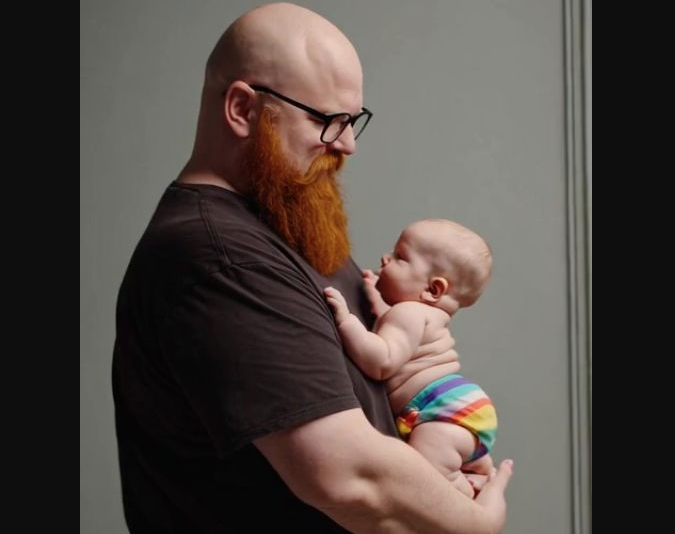My husband, 36, and I, 31, are parents to two young children, both under five.
I am their full-time caregiver at home.
He works extended hours at his job and often reminds me that he covers the household expenses.
I manage the cooking.
I handle the cleaning.
I bathe the children, run all the errands, pay the utility bills, schedule appointments, stay up during their fevers, and still somehow have dinner ready when he returns home.
This happens every.
Single.
Day.
He arrives home, tosses his shoes in the entryway, glances at his phone, and acts as if I’ve spent the entire day relaxing.
He has never prepared a school lunch.
He has never once driven the children to daycare.
His concept of parenting involves placing them in front of the television when I desperately need a moment to myself.
The breaking point occurred last Thursday.
I was attempting to clean up a spilled smoothie while our toddler was screaming in the background and the baby was fussy due to teething.
My husband walked in, observed the chaos, and let out a sigh.
“I don’t understand why you can’t manage this.
You’re home all day.”
I paused.
I just… stopped.
Later that evening, after the children were asleep, I calmly packed a bag.
He appeared perplexed.
“Where are you going?”
I approached him, handed him the baby monitor, and stated: “Figure it out yourself.
You’re about to manage everything on your own.”
I walked out with only my keys.
And this morning?
He sent me a text at 6:12 AM, inquiring about the location of the diapers.
I haven’t responded yet.
Instead, I checked into a nearby hotel using the remaining birthday money my mom gave me in July.
It wasn’t luxurious, but it was tranquil.
No tiny feet scampering across the floor.
No crying, no sticky fingers on my shirt.
Just me, in a clean bed, with no one needing my attention.
Initially, I felt a pang of guilt.
But then, I slept.
I truly slept.
For what felt like years, I woke up without an alarm, without someone needing something, without someone asking where their socks were.
By 10 a.m., he had texted again.
“He won’t eat the oatmeal.
He’s throwing it.”
I took a slow sip of my coffee and silenced my phone.
I truly needed this break.
Around 1 p.m., his mom called.
I let the call go to voicemail.
When I listened to it later, she sounded irritated.
“Call your husband.
He’s struggling.
The baby’s crying and the toddler had an accident.
This isn’t how you solve problems in a marriage.”
I nearly chuckled.
Solve problems?
Lady, your son is the problem.
I remained away that entire day and the following one.
On the second morning, I reactivated my phone.
There were 17 messages waiting.
Some were from him, some from his mom, and even one from his sister.
The most recent one read:
“I’m sorry.
I didn’t realize how difficult it is.
Please come home.”
I didn’t reply immediately.
I needed him to sit with the reality a little longer.
To truly experience what it’s like when no one acknowledges your efforts, when you’re constantly available, when every cry, spill, and tantrum falls solely on you.
When I finally called him that evening, he sounded exhausted.
Like, genuinely exhausted.
“I haven’t slept more than two hours.
I haven’t had a warm meal.
I didn’t know how much you actually did until now.”
I didn’t gloat.
I could have said, “I told you so,” but I refrained.
I simply allowed the silence to convey the message.
Then he uttered something I hadn’t anticipated.
“I requested a week off from my boss.
Starting Monday.
I want to learn.
I want to help.
I messed up.”
That was the initial surprise.
He had never taken time off work unless it was for a vacation or an illness.
He wasn’t flawless over the next week, but he made an effort.
He took both children to the pediatrician.
He packed their bags for daycare.
He prepared spaghetti (which was slightly undercooked but edible).
He cleaned, even if it wasn’t to my exact standards.
And he apologized.
Not just once—repeatedly.
Little things.
Like, “I’m sorry I ever made you feel unseen,” or “I didn’t realize a clean house required so much of your energy.”
And the biggest surprise?
He booked a babysitter for us on Saturday afternoon and took me to a charming little café I’d always wanted to try.
Just the two of us.
No sippy cups or Cheerios in my handbag.
He held my hand and declared, “You matter.
What you do matters.
I was wrong.”
For the first time in a long while, I didn’t feel like I was drowning.
But the true revelation came from someone entirely different.
His mom called me a few days later.
She began with, “I owe you an apology.”
That woman had never apologized for anything in the ten years I’d known her.
“I used to tell my husband the same thing you told my son.
And he never listened, either.
I thought that’s just how it was.
But when he called me crying, asking how to warm up formula and soothe the baby’s screams, I realized maybe it’s time we break this pattern.”
We spoke for an hour.
She shared stories I’d never heard—about feeling unseen, unsupported, how she once locked herself in the laundry room just to weep.
That’s when it truly dawned on me.
This isn’t solely about my husband.
Or even his mother.
It’s about how society conditions us to perceive women’s labor—especially mothers’—as something that just “happens.”
As if it’s innate and effortless and not actual work.
But it is.
It’s the most demanding work I’ve ever undertaken.
And all too often, no one notices until you cease doing it.
Since that week, things have shifted.
My husband still makes mistakes.
He occasionally forgets the diaper bag or mixes up bath time with bedtime.
But he shows up.
He tries.
He expresses his gratitude.
And when he sees me becoming overwhelmed, he doesn’t just scroll on his phone—he steps in to help.
Last night, he brought me tea while I was folding laundry and said, “You don’t have to do it all.
Not by yourself.”
And I finally believed him.
So, if you’re reading this and you feel invisible, unappreciated, or on the verge of collapsing—you’re not irrational.
You’re not indolent.
You’re not “just a mom.”
You are achieving the impossible, every single day.
And if someone makes you feel like you accomplish nothing all day?
Hand them the baby.
Walk out with your keys.
Let them witness it.
Because sometimes the only way to be heard is to stop speaking and start walking.
It was frightening to leave, even for only two days.
But it salvaged my marriage.
It reminded me of who I truly was.
And it imparted a lesson to my husband—and his entire family—that they will never forget.
Sometimes, the most impactful statement you can make is through silence.
If this story resonated with you, please share it with someone who might need to hear it.
Perhaps they are the overwhelmed mother.
Perhaps they are the oblivious partner.
Either way, perhaps it will help them grasp what genuine love and labor entail.




